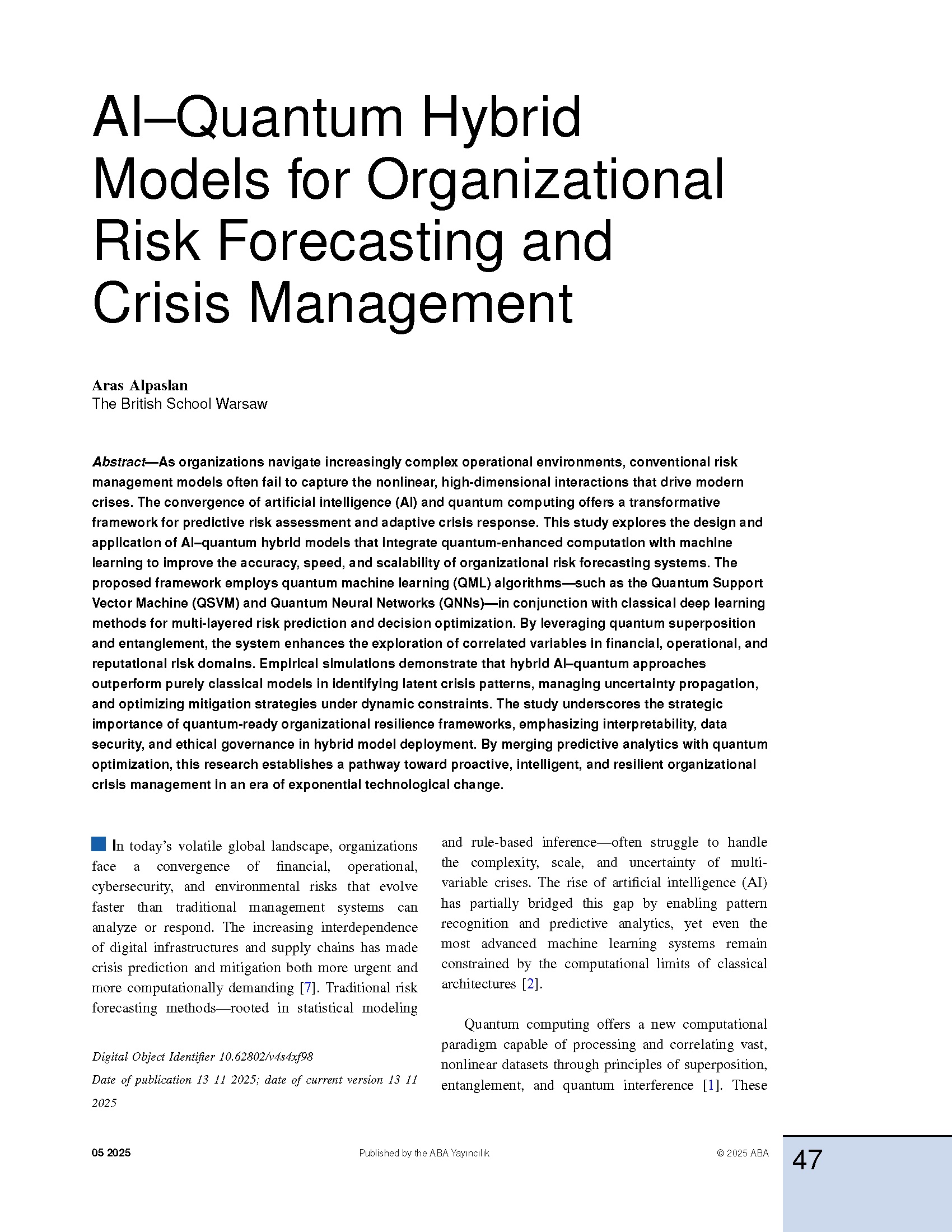AI–Quantum Hybrid Models for Organizational Risk Forecasting and Crisis Management
DOI:
https://doi.org/10.62802/v4s4xf98Keywords:
artificial intelligence, quantum computing, hybrid models, risk forecasting, crisis management, quantum machine learning, decision optimization, organizational resilienceAbstract
As organizations navigate increasingly complex operational environments, conventional risk management models often fail to capture the nonlinear, high-dimensional interactions that drive modern crises. The convergence of artificial intelligence (AI) and quantum computing offers a transformative framework for predictive risk assessment and adaptive crisis response. This study explores the design and application of AI–quantum hybrid models that integrate quantum-enhanced computation with machine learning to improve the accuracy, speed, and scalability of organizational risk forecasting systems. The proposed framework employs quantum machine learning (QML) algorithms—such as the Quantum Support Vector Machine (QSVM) and Quantum Neural Networks (QNNs)—in conjunction with classical deep learning methods for multi-layered risk prediction and decision optimization. By leveraging quantum superposition and entanglement, the system enhances the exploration of correlated variables in financial, operational, and reputational risk domains. Empirical simulations demonstrate that hybrid AI–quantum approaches outperform purely classical models in identifying latent crisis patterns, managing uncertainty propagation, and optimizing mitigation strategies under dynamic constraints. The study underscores the strategic importance of quantum-ready organizational resilience frameworks, emphasizing interpretability, data security, and ethical governance in hybrid model deployment. By merging predictive analytics with quantum optimization, this research establishes a pathway toward proactive, intelligent, and resilient organizational crisis management in an era of exponential technological change.
References
Acampora, G., Ambainis, A., Ares, N., Banchi, L., Bhardwaj, P., Binosi, D., ... & Wilhelm, F. K. (2025). Quantum computing and artificial intelligence: status and perspectives. arXiv preprint arXiv:2505.23860.
Gacu, J. G., Monjardin, C. E. F., Mangulabnan, R. G. T., & Mendez, J. C. F. (2025). Application of artificial intelligence in hydrological modeling for streamflow prediction in ungauged watersheds: A review. Water, 17(18), 2722.
Kolapo, A. A., & Oyewole, B. (2025). Building Quantum-Ready AI Frameworks for the Future of Financial Security.
Mahjoub, A., Khalilian, M., & Mohammadzadeh, J. (2025). QQLAOA: task scheduling with multi-objectives quantum mutation and Q-learning based arithmetic optimizer algorithm in cloud data centers. Computing, 107(4), 109.
Marmon, S. (2025). The Future of Financial Forecasting: How AI and Quantum Technologies Will Transform Global Markets. Available at SSRN 5234109.
Olaitan, O. F., Ayeni, S. O., Olosunde, A., Okeke, F. C., Okonkwo, U. U., Ochieze, C. G., ... & Akatakpo, O. N. (2025). Quantum Computing in Artificial Intelligence: a Review of Quantum Machine Learning Algorithms. Path of Science, 11(5), 7001-7009.
Yoon, J., Alkhudary, R., Talluri, S., & Féniès, P. (2025). Risk Management and Macroeconomic Disruptions in Supply Chains: The Role of Blockchain, Digital Twins, Generative AI, and Quantum Computing. IEEE Transactions on Engineering Management.
Zafar, A. (2025). Quantum computing in finance: Regulatory readiness, legal gaps, and the future of secure tech innovation. European Journal of Risk Regulation, 1-32.


